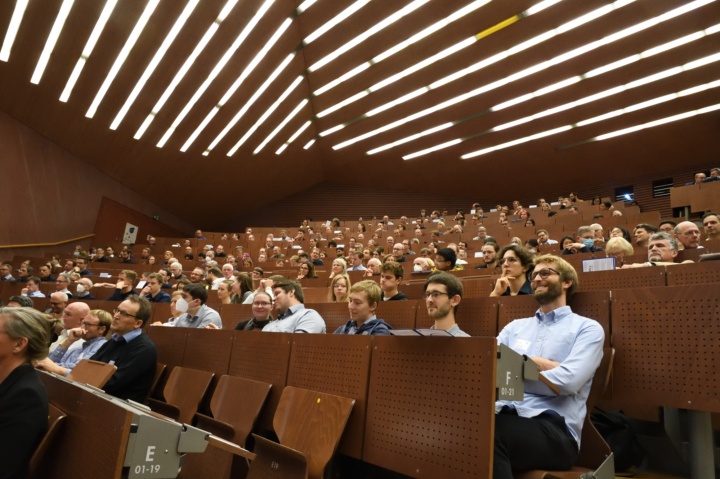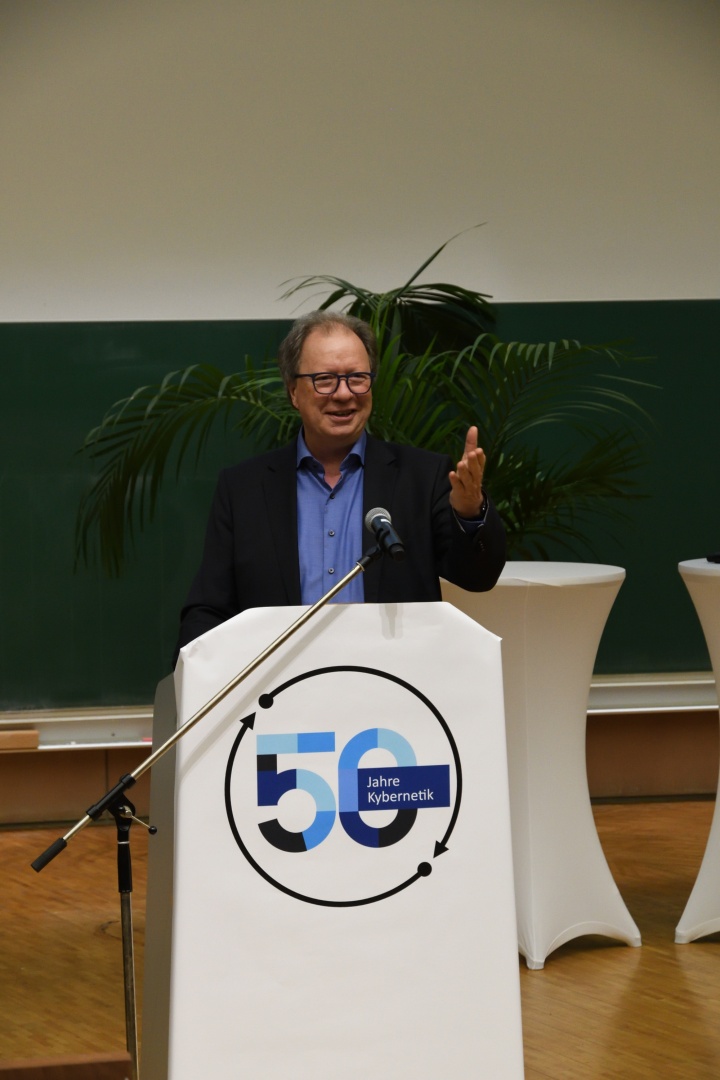"Cybernetics" - it sounds like cyborgs and cyberspace, like science fiction and the future. A future with a long history. The study program "Technical Cybernetics" at the University of Stuttgart has existed for 50 years. It deals with mathematical modeling, simulation, and control of complex dynamic systems. At a time when everyone is talking about autonomous and intelligent systems, the subject is more topical than ever and thus testament to the vision and foresight of its founders.
On September 24, alumni and students celebrated the 50th anniversary, together with those responsible for the program. More than 500 alumni returned to the lecture hall, invited by the alumni association KybAlumni and the Institute for Systems Theory and Automatic Control. "It was probably a world record: The most people with a degree in technical cybernetics in one room," noted the Dean of Technical Cybernetics, Professor Frank Allgöwer, with satisfaction. Musical accompaniment was provided by the specially founded "CybOrch" (pronounced cyborg) orchestra of alumni, staff and professors. The celebratory event was intended to encourage mutual exchange and provide a platform for cyberneticists to get together. Not only the good cohesion between the students, but also the excellent support from the lecturers have characterized this small but fine study program from the beginning.
Thomas Riegraf, Managing Director of Vector Informatik GmbH and himself an alumnus of the course, emphasized this cohesion in his welcoming address and praised the exemplary support provided by the lecturers. This enabled him to study abroad in the USA as early as the 1980s. Professor Wolfram Ressel also addressed this bond in his speech. "The sheer number of alumni present clearly reflects this strong bond," said the Rector of the University of Stuttgart. Since many of the alumni now hold key positions in industry and business, this network directly benefits study program graduates.
Ressel also highlighted the exceptional quality of the program. He went on to emphasize that despite the relatively small size of 50 to 60 freshmen each year, the program has always succeeded in finding the right young people who are motivated and willing work hard. Since it was founded 50 years ago, the average Abitur grades of first-year students have been among the best throughout the university, and technical cybernetics is the program that has the largest percentage of interregional students in Stuttgart. "This quality is also apparent when one considers the fact that technical cybernetics is the course in which the highest number of the sons and daughters of other professors at the University of Stuttgart can be found," Allgöwer added with a wink.
Technical Cybernetics - Exemplary for the "Stuttgarter Weg"
This is largely due to the wide scope of the study program. On the one hand it is mathematical and method-based, but also interdisciplinary with applications in engineering and the natural sciences. A "good example of the Stuttgart way," said Ressel, who also emphasized the proximity of the program to the university's vision of "Intelligent Systems for a Sustainable Society" and its relationship with "Cyber Valley". For students, the huge scope also sometimes presents a challenge, but it pays off after graduation. The method-oriented and interdisciplinary nature of the study program opens many professional fields and areas of interest. Career opportunities for cyberneticists are excellent and largely unaffected by economic cycles due to the breadth of possible professions. "This breadth has also helped me overcome the fear of delving into other fields later on. But at the same time, it also prepared me for the fact that learning new roles is not always easy," emphasizes Riegraf.
20 years of „Kyb-Alumni“
Parallel to the 50th anniversary of the study program, the study program's alumni association "Kyb-Alumni" also celebrated its 20th anniversary. The aim of the association is to promote the exchange of information and experience between students, business and science involved in the study program, as well as to cultivate ideas from the field of technical cybernetics in business, research, and teaching and to exchange information with interested members of the public. During the course of the evening, it also became very clear that no alumni need hide. "Just for fun, we counted how many graduates from our class now hold a professorship, and ended up with a rate of over ten percent," reported David Remy proudly, a graduate of the program and now a professor himself at the University of Stuttgart. The strong research orientation of the program is also reflected by the number of doctoral students. More than half of the students now begin a doctorate in engineering following their master's degree.
Prepared for the future
The subject and the study program are also very future oriented; and it was not only the participants Albrecht Irion, head of the department "Engineering Parking Systems Platform & Function Development" at Robert Bosch GmbH, Siegfried Delzer, founder and managing director of Delzer Kybernetik GmbH, and Prof. Meike Tilebein, who agreed on this during the panel discussion "Is cybernetics still relevant today?" The number of applicants also reinforce this view. The study program will enter its 51st year on October 17 with an expected 50 new students and will thus remain "a pearl of the university" for years to come; "a pearl with patina and edged with gold," emphasized Ressel.



